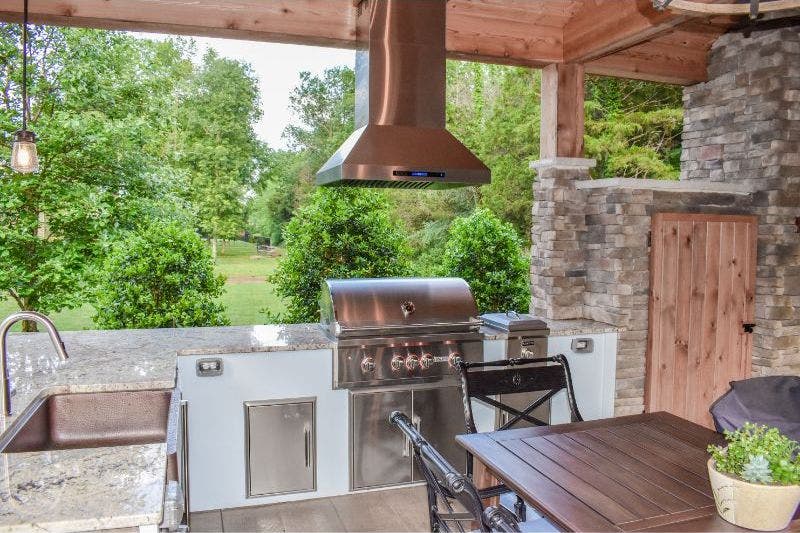Melvin is an expert for portable products.The site is for sharing everything about portable products for online buyers.
You need a hood for an outdoor kitchen to effectively remove smoke and odors. A hood helps maintain a clean and comfortable outdoor dining experience by ventilating the cooking area and preventing the accumulation of smoke and grease particles.
It also prevents the spread of cooking odors to other areas of your outdoor space. Furthermore, a hood can protect your outdoor kitchen equipment from smoke damage and prolong its lifespan.
Installing a hood in your outdoor kitchen is essential for ensuring a pleasant cooking and dining experience while also maintaining the longevity of your equipment.
Importance Of Proper Ventilation
Proper ventilation plays a crucial role in ensuring a functional and comfortable outdoor kitchen. A hood is an essential component that aids in eliminating smoke and odors caused by grilling or cooking. Without a hood, these odors can spread throughout the outdoor space, creating an unpleasant dining experience.
Additionally, a hood helps to prevent grease buildup by capturing and filtering the grease particles that may otherwise settle on surfaces or appliances, making cleaning and maintenance easier.
Enhancing cooking comfort
With a properly installed hood, the cooking comfort in your outdoor kitchen is significantly enhanced. The hood effectively removes smoke, steam, and heat, creating a more comfortable environment for the cook and guests.
It helps to keep the surrounding air fresh and free from fumes, improving the overall experience of outdoor cooking. Investing in a high-quality hood is essential for anyone who wants to enjoy the benefits of an outdoor culinary space without the drawbacks of smoke, odors, and grease buildup.
Advantages Of Using A Hood In Outdoor Kitchens
Advantages of Using a Hood in Outdoor Kitchens
- Ensuring safety and compliance
- Protecting kitchen appliances and surfaces
- Creating a pleasant cooking environment
A hood is an essential component of an outdoor kitchen, offering several advantages. First and foremost, it helps ensure safety and compliance. By effectively capturing and venting smoke, grease, and odors, a hood helps to prevent potential fire hazards and keep the surroundings free from pollutants.
Another benefit of using a hood in an outdoor kitchen is the protection it provides to your appliances and surfaces. Grease and smoke can damage your equipment over time, leading to costly repairs or replacements. A hood helps to extend the lifespan of your appliances and keeps the kitchen area clean.
Moreover, having a hood in your outdoor kitchen creates a pleasant cooking environment. It helps to eliminate smoke and odors, allowing you to enjoy your outdoor meals without any discomfort. The hood also helps to regulate the temperature, preventing heat buildup in the cooking area.
Overall, investing in a hood for your outdoor kitchen is a wise decision. It ensures safety, protects your appliances, and enhances the cooking experience. Consider incorporating a hood into your outdoor kitchen design to make the most out of your outdoor cooking adventures.
Factors To Consider When Choosing An Outdoor Kitchen Hood
When choosing a hood for your outdoor kitchen, there are several important factors to consider:
- Size and capacity requirements: Determine the size and capacity of the hood based on the size of your outdoor kitchen. Consider the number and type of cooking equipment you plan to use, as well as the amount of smoke and grease that will be generated.
- Type of cooking equipment: Different types of cooking equipment may require different hoods. Consider whether you will be using a grill, stove, or other appliances in your outdoor kitchen, and choose a hood that is suitable for the specific equipment you plan to use.
- Outdoor kitchen layout and design: The layout and design of your outdoor kitchen will also impact the choice of hood. Consider the location and placement of the cooking equipment, as well as any existing structures or features that may affect the installation of the hood.
By carefully considering these factors, you can choose the right hood for your outdoor kitchen that effectively captures smoke and grease, ensuring a comfortable and enjoyable cooking experience.
The Different Types Of Outdoor Kitchen Hoods
Do You Need a Hood for an Outdoor Kitchen
Wall-mounted Hoods
Wall-mounted hoods are a popular choice for outdoor kitchens. They are installed directly on the wall above the cooking area, providing effective ventilation and removing smoke, grease, and odors from the air.
These hoods come in various sizes and designs to complement different styles of outdoor kitchens. They are easy to install and can be ducted to vent the air outside or equipped with a recirculating kit to filter and recirculate the air.
Island Hoods
Island hoods are suitable for outdoor kitchens with an island or peninsula layout. They are suspended from the ceiling above the cooking surface and provide efficient ventilation.
Island hoods are equipped with powerful ventilation systems and multiple fan speeds to ensure the effective extraction of smoke and cooking odors. They enhance the aesthetics of the outdoor kitchen and add a focal point to the space. Island hoods can be customized to match the overall design and style of the outdoor kitchen.
Downdraft Hoods
Downdraft hoods are an alternative option for outdoor kitchens where traditional hood installations are not feasible. These hoods are integrated into the cooking surface and remain hidden when not in use.
When activated, a powerful ventilation system rises from the countertop and effectively captures and eliminates smoke, steam, and odors. Downdraft hoods are a space-saving solution and provide flexibility in outdoor kitchen design. They are ideal for installations where aesthetics and open views are a priority.
Understanding Ventilation Systems For Outdoor Kitchens
Proper ventilation is crucial for outdoor kitchens to maintain an enjoyable cooking experience. Whether you need a hood or not depends on your specific setup and preferences.
| Ventilation Type | Description |
|---|---|
| Ducted ventilation | This type of ventilation system uses ducts to remove the cooking fumes and smoke from the outdoor kitchen. The ducts are connected to an exhaust fan, which helps in directing the air outside, keeping the area clean and odor-free. |
| Recirculating ventilation | In this system, the air passes through filters to remove grease, smoke, and odors, before being recirculated back into the kitchen area. It is a suitable option if ductwork is not feasible. |
Consider your budget, local regulations, and the specific cooking methods you plan to use when deciding on the type of ventilation for your outdoor kitchen. While a hood is not always mandatory, it is essential for adequate airflow and removing unwanted odors.

Credit: rtaoutdoorliving.com
Installation And Maintenance Tips For Outdoor Kitchen Hoods
A hood is an essential component of an outdoor kitchen as it helps remove smoke, odors, and grease from the cooking area. Proper installation and maintenance of the hood are crucial to ensure optimal performance and longevity.
Proper positioning and venting
The hood should be positioned directly over the cooking area to effectively capture and exhaust the smoke. It should be installed at a height that allows sufficient headroom, while still maintaining an adequate distance from the heat source. Venting the hood to the outdoors is essential to prevent the accumulation of harmful pollutants inside the kitchen.
Regular cleaning and maintenance for optimal performance
To ensure the hood’s performance is not compromised, it is important to clean and maintain it regularly. Grease and debris can accumulate in the filters and ducts, leading to reduced efficiency and potential fire hazards. Cleaning the filters, ducts, and hood surface should be done on a regular basis, following the manufacturer’s guidelines.
By following these installation and maintenance tips, you can ensure that your outdoor kitchen hood functions effectively, providing a comfortable cooking environment and enhancing your overall outdoor cooking experience.
Common Misconceptions About Outdoor Kitchen Hoods
Outdoor kitchens have become increasingly popular in recent years, offering homeowners a convenient and stylish way to cook and entertain outdoors.
However, one common misconception about outdoor kitchens is the belief that they don’t require hoods. Some people assume that other ventilation methods, such as natural airflow and exhaust fans, are sufficient for removing smoke and odors.
Contrary to this belief, having a hood for your outdoor kitchen is essential. While natural airflow and exhaust fans can help to some extent, a hood provides a more effective and efficient way to remove smoke, grease, and other airborne particles.
A quality hood will not only eliminate unpleasant odors but also reduce the risk of grease buildup, which can be a fire hazard.
Additionally, hoods in outdoor kitchens can help maintain a comfortable and enjoyable cooking environment by controlling heat and reducing the amount of smoke that lingers in the area. They also help to protect your outdoor kitchen appliances and furniture from the damaging effects of smoke and grease.
Frequently Asked Questions On Do You Need A Hood For An Outdoor Kitchen
Does An Outdoor Kitchen Need A Hood?
Yes, an outdoor kitchen should have a hood to effectively remove smoke, odors, and excess heat. A hood helps prevent the accumulation of grease and keeps the cooking area clean, while also improving air quality and ensuring a comfortable grilling experience.
Final Words
Outdoor kitchens can greatly enhance the dining experience and enjoyment of your outdoor space. However, the question remains: do you really need a hood for your outdoor kitchen? The answer depends on various factors, such as the type of cooking you do and the location of your outdoor kitchen.
While hoods can provide ventilation and prevent smoke accumulation, they are not always necessary. Ultimately, the decision should be based on your specific needs and preferences. Consider these factors carefully when determining whether a hood is a necessary addition to your outdoor kitchen setup.

Melvin is an expert for portable products.The site is for sharing everything about portable products for online buyers.

